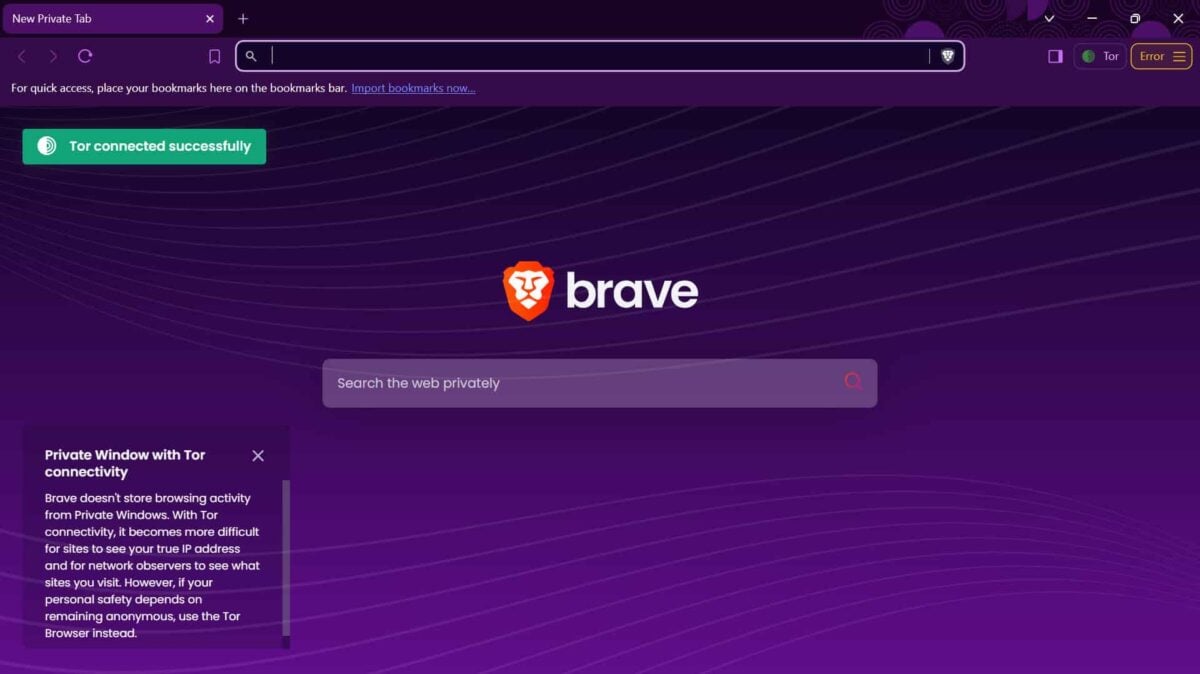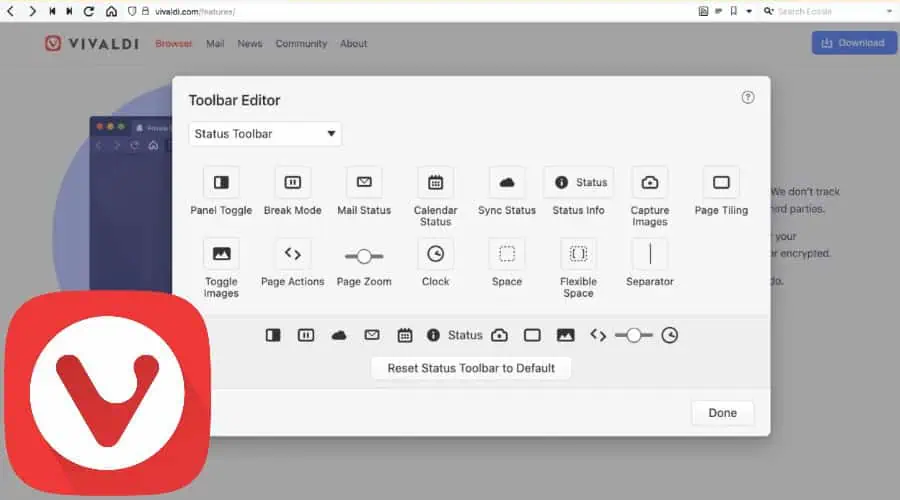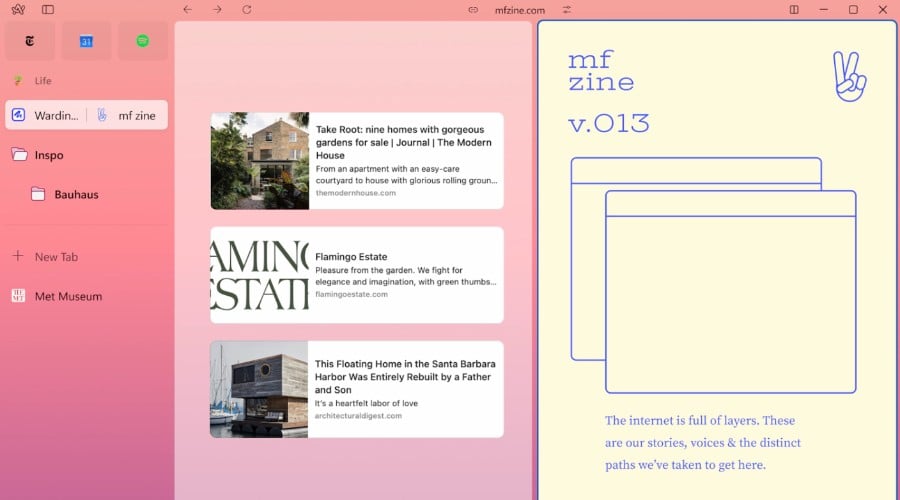UC Browser Alternative – 7 Secure and Customizable Options

Searching for a good UC Browser alternative? You’re in luck. I tested more than 20 browsers to compare privacy, performance, and features.
I narrowed it down to the top 7 picks and here’s how they stack up against UC Browser and each other.
Best 7 UC Browser Alternative Browsers
1. Opera – Best UC Browser Alternative

I mostly used UC Browser because of its built-in ad blocker and speed. Opera serves both these purposes and so much more.
In terms of privacy, Opera not only has private browsing and an advanced ad blocker for neutralizing tracking cookies and display ads, but it also boasts a free VPN. This encrypts all internet activity and disguises your location by masking your IP address.
Moreover, after experiencing its Aria AI assistant, Opera became my go-to UC Browser alternative. This powerful feature can sum up any web page in seconds and explore its topics outside of the page. It also functions as a chatbot for asking questions rather than using search engines and can generate both text content and images.
If you prefer a more traditional user interface, UC still has the advantage, but Opera’s ability to use AI and messaging apps from the sidebar is more of a help than a hindrance.
Like UC, Opera is Chromium-based, so you get access to a huge library of extensions. They also offer a similar level of native customizations, such as themes and shortcuts.
The one feature it lacks is UC Browser’s data compression which improves page load speed.
Pros:
- Free ad-blocker and VPN
- Excellent AI assistant
- Use messaging and social apps in-browser
Cons:
- More sidebar clutter
- Lacks UC’s data compression
2. Chrome – Best for Google Cross-device Syncing

The web browser stats don’t lie when it comes to Google. Its flagship Chrome is still the most popular in the world. And, while it might have a larger impact on system performance than most, it has a lot of features UC browser lacks to make up for it.
Its interface is surprisingly similar, and as the foundation of Chromium both share a lot of the same extensions, though compatibility is obviously higher with Chrome. The main difference is UC is more customizable out of the box.
One feature that can now be downloaded is Chrome’s new AI assistant. If you like UC’s custom themes, Chrome’s AI can actually generate themes based on your input. It also automatically offers tab group suggestions based on your workflow.
If you’re an Android user or otherwise use Google as your main web account, Chrome’s seamless cross-device syncing is a no-brainer. It’s also well-integrated with Docs, Drive, and other Google services.
Pros:
- Huge extension library
- Built-in AI version available
- Google account syncing and integrations
Cons
- Uses a lot of RAM
- Not as customizable by default
3. Firefox – Best non-Chromium Alternative

Not everyone wants a Chromium-based browser and Firefox comes the closest to offering a similar variety of extensions and add-ons.
It also provides native customization options, not too dissimilar to UC Browser. You can move its toolbars and menus around and change themes. For the more tech-savvy, its deeper developer settings allow for further customization that isn’t available with UC or most common browsers.
While UC’s ad blocker is appealing, Firefox is no slouch when it comes to privacy and security. It blocks tracking cookies and supports per-site privacy rules.
One unique feature is Firefox Pocket, which lets you easily save content such as videos and pages for offline viewing.
Its one drawback, like Chrome, is the excessive use of RAM. Especially compared to UC Browser.
Pros:
- More customizable
- Good variety of extensions
- Unique features like Pocket saving
Cons:
- Limited ad blocking
- More resource intensive
4. Edge – Best Browser for Windows Enthusiasts

For those who rely on Microsoft apps like Outlook, Calendar, Office 365, and Cortana, Microsoft Edge is an obvious alternative to UC Browser on desktop because it’s finely tuned to Windows.
However, its bulkier interface with multiple sidebars takes some getting used to if you prefer UC’s minimalist approach.
If you want a good AI assistant, Edge’s Copilot will answer questions, summarize and explore web pages, and help generate content.
I found its shopping feature to be particularly useful for automatically finding promo codes and suggesting other stores with cheaper prices.
Like UC Browser, Edge runs on Chromium, so there’s no shortage of extensions with the added benefit of Microsoft’s own store of add-ons.
Edge has all the standard privacy features but lacks a built-in ad blocker. Questions have also been raised about it sending data back to Microsoft.
Pros:
- AI Copilot
- Chromium and Microsoft add-ons
- Integrated with Microsoft and Windows apps
Cons:
- Bulkier interface
- Some privacy concerns
5. Brave – Best for Privacy and Security

Built with privacy and security in mind, Brave browser is becoming a popular UC alternative. It offers a similar minimalist interface but is packed with features to protect your browsing activity.
While both offer a full built-in ad blocker that even stops annoying display ads, Brave also offers an affordable VPN subscription to ensure everything you do online is encrypted.
Furthermore, its Tor browsing mode is free, offering similar encryption to a VPN but with the benefit of accessing the dark web.
Unlike UC Browser, you get a comprehensive AI assistant called Leo. It can summarize highlighted text and pull more context from the web. It also functions as a chatbot to find info or generate content.
Like UC Browser, Brave has a minimal impact on system performance and keeps the screen clear of too many menus and toolbars. Similarly, more features can be added via Chromium extensions.
One of its standout features is Brave Talk, an unlimited conferencing app, similar to Teams.
Pros:
- Most secure web browser
- Browse the dark web
- Leo AI assistant
Cons:
- VPN is a premium feature
6. Vivaldi – Best for Customization

Like the scaled-back and customizable nature of UC Browser? Then Vivaldi is the perfect alternative.
It lets you move toolbars and other elements wherever you want and supports custom themes that can be scheduled to change periodically. You can also customize icons and create shortcuts and mouse gestures, to name just a few possible tweaks.
I particularly like its advanced tab management, which supports tiling, stacking, and even an old-school tree structure.
Not only does Vivaldi have a full ad blocker like UC Browser, but it also provides a VPN for free to hide your IP address and encrypt internet traffic from snoopers.
It shares a similar Chromium-based back end, so you get lots of extensions. Moreover, its minimalist interface and ad blocker means it uses less RAM than the more mainstream browsers.
Pros:
- More customizable than UC
- Free VPN and ad-blocker
- Low RAM usage
Cons:
- Customizations have a learning curve
- Lacks UC’s data compression
7. Arc – Best new UC Browser alternative

Having only made it to Windows from Mac in 2024, Arc is already a good UC Browser alternative thanks to its slim interface and unique features.
The Arc address bar is completely hidden until clicked, while its vertical tabs can be retracted to ensure webpages get as much screen space as possible.
For those who don’t like jumping between windows and tabs, it offers a productive dual window mode to view two pages side-by-side.
Another unique feature is Easel, which organizes collections of web content in a scrapbook-like format. Easels are shareable and can be customized with text, images, and other media.
I also like that you can organize all your apps, bookmarks, and tabs on the left.
Arc has great privacy and security features, including a built-in version of uBlock Origin. This blocks trackers, dangerous sites, and even display advertising, and you can control filters on a per-site basis.
Similar to UC Browser, it supports Chromium extensions, but compatibility is not as wide as other browsers.
Pros:
- Minimalist interface
- Powerful ad blocker
- Two-page view and Easel Collections
Cons:
- Limited extensions
- Lacks AI assistant
How to Choose the Best UC Browser Alternative
To choose the best UC Browser alternative, I considered the following important browser features:
- Privacy and Security – With an in-built ad blocker, phishing protection, and private browsing, it’s important for alternatives to meet these standards. Some of the best like Opera and Brave kick it up a gear with VPNs and other features to keep you safe and anonymous.
- Customization – UC Browser users will be aware of its customizability, with custom themes, rearranging of icons and toolbars, and support for shortcuts. Functionality can be extended further with extensions. All alternatives show a good level of customization and extensions, with the likes of Vivaldi offering more personalization than any other.
- System Performance – UC Browser has the benefit of data compression, which makes it speedier than a lot of browsers. However, most modern s try to keep RAM usage to a minimum without compromising features. Vivaldi, Brave, and Arc are especially good at minimizing impact on system performance. Check below to see how all browsers compare.
- User Interface – If you like a minimalist browser interface, UC keeps it simple. In choosing an alternative, you must weigh up whether you want more features or less going on onscreen. Fortunately, even browsers with multiple sidebars like Edge tend to retract them when not in use.
- AI Assistants – Where UC Browser falls short is its lack of AI. The best alternatives have now implemented some form of AI to help sum up page content, streamline info gathering, and in Opera’s case, even generate content like images from simple AI prompts.
Summary
Now you know the ins and outs of the top UC Browser alternatives, how do they compare in performance and what other features can be easily ranked.
Method: To compare each browser’s impact on system performance, I loaded 5 tabs of content and logged an average range of RAM usage.
| Browser | RAM Usage | Extensions | AI Assistant | Customization | Privacy Rating |
| Opera | 1,300-1,320 MB | Chromium | Yes (Inc. Text-to-Image) | Limited | 4/5 |
| Chrome | 1,750-1,800 MB | Full Chromium | Yes | Limited | 2.5/5 |
| Firefox | 1,700-1,720 MB | Firefox Extensions | No | Interface and developer settings | 3/5 |
| Edge | 1,000-1,050 MB | Chromium and Microsoft Store | Yes | Limited | 2.5/5 |
| Brave | 560-580 MB | Chromium | Yes | Limited | 5/5 |
| Vivaldi | 595-615 MB | Chromium | No | Full interface tweaking | 4/5 |
| Arc | 620-650 MB | Limited Chromium | No | Limited | 3.5/5 |
In conclusion, Opera stands out as the best all-around UC Browser alternative. It offers modern features like a free VPN and powerful AI assistant without being as resource-intensive as Edge and Chrome.
However, if privacy and security are your thing, Brave is an excellent choice. Meanwhile, Vivaldi has taken customization to a new level.
Which UC Browser alternative do you like the most? Let me know why in the comments below!
Read our disclosure page to find out how can you help MSPoweruser sustain the editorial team Read more




User forum
0 messages